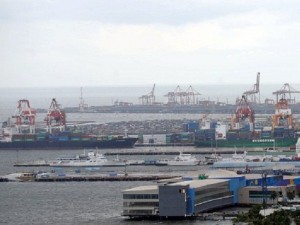ATI profit dipped 32% as of Sept.

Asian Terminals Inc. (ATI), which operates ports in Manila and Batangas, said profit dipped by a third in the nine months through September on a change in accounting policy while revenues were up.. AFP FILE PHOTO
MANILA, Philippines—Asian Terminals Inc. (ATI), which operates ports in Manila and Batangas, said profit dipped by a third in the nine months through September on a change in accounting policy while revenues were up.
The company said in a Philippine Stock Exchange filing that net income during the period hit P843.1 million, down 31.8 percent, following a shift in the way it recognizes fixed fees payable to regulator Philippine Ports Authority.
Removing this impact, ATI said profit would have ended 0.9 percent higher to PP1.23 billion.
This comes as ATI posted a 4-percent revenue increase to P3.98 billion during the nine-month period.
It said revenues from international operations of South Harbor in Manila grew 6.7 percent due to “favourable unit rates” while revenues from domestic terminal operations suffered from lower volume and dipped 27.1 percent.
Revenues from the Port of Batangas were also up 8.8 percent due to container volume and higher number of so-called roll-on-roll-off vehicles and passengers. Expenses rose 4.2 percent to P2.2 billion during the nine-month period.
In a separate statement, ATI said its long-term outlook remains positive as it gears up for greater growth ahead.
“The company is continuously building up efficiency and capacity at its gateway Manila South Harbor in line with the industry’s expansion,” the ports operator noted.
Early this month, ATI took delivery of two state-of-the-art rubber-tired-gantry cranes (RTGs) to beef-up its container handling fleet.
“More equipment are scheduled to arrive at South Harbor early next year including a high-capacity ship-to-shore crane, additional RTGs, loaders, internal transfer vehicles and other operation critical port equipment,” it said.
ATI’s latest equipment acquisition is part of its initial P 1.8 billion capital outlay for the port this year which includes the rehabilitation of Pier 3. The works on the pier involve the extension of crane rails and the expanded back-up container storage areas within the pier, which will enable Manila South Harbor to accommodate more and bigger ships.
This is in line with the company’s investment commitments with the PPA, the statement showed.—Miguel R. Camus

